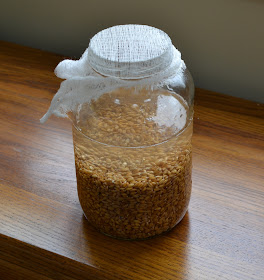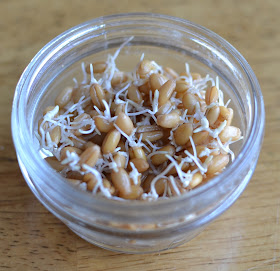Christa likes bread a whole lot, though. She is also generally a big fan of cereal grains and pasta in particular. It was partially due to this that after putting together a batch of tabbouleh together one afternoon that I started to consider some healthy grain options that we could both enjoy together. I like the idea of sprouting grains for the same reason that I like to sour my oats - make the nutritional quality greater for the same amount of calories with just a little extra investment of time.
Grains are cheap, too, relatively speaking. This appeals to me, because quality pasture raised animal products (meat, milk, eggs...) are not. It's good to be able to make up the balance of one's caloric needs with something that only costs a couple of bucks at most per pound. I decided to go with hard winter wheat berries, as they were only about $1.50/lb and I thought that we might be able to use them in much the same way as bulgur.
The procedure is very simple, and I'm happy to say that even on my first attempt that I had a great batch of wheat sprouts. I usually sprout about a cup of wheat each week, which gets us through for a couple of servings. In order to sprout wheat, or by extension just about any other whole grain, you'll need a jar of some sort with a semipermeable cover that will allow water and air to circulate while containing the grains. I use an old glass jar that I saved and make a makeshift cover out of a rubber band and some cheesecloth.
The first thing that you'll need to do is to soak the grains in warm water for about 8-12 hours. This will rehydrate them and initiate the sprouting process. You can see below how the grains have plumped up a bit after the initial soaking period.
Now, pour the water off of the grains, rinse again with warm water, drain, and place them in a dark spot (I used my food dehydrator because it is on the kitchen counter already and is quite dark inside). Any box or even a paper bag would be just fine. Lay the jar on its side as shown, in order to give the grains room and to allow air to circulate around them to avoid growing mold.
In another 12-24 hours, they look like this when I do wheat:
This is when I stop the process by placing the sprouts in the refrigerator in a covered container to be used in cold salads (toss with parsley, olive oil, and balsamic vinegar), or steam them and coat with butter and salt, or maple syrup, honey, or anything else that you might put on a hot breakfast cereal. Use your imagination with these; wheat is a fairly blank canvas (though the sprouted wheat does have a really excellent flavor and texture without the addition of anything else). The sprouts will keep for several days once refrigerated.








No comments:
Post a Comment